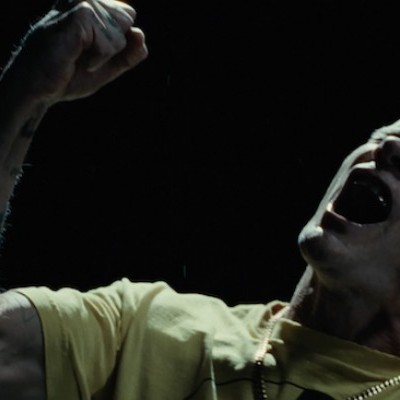Dec 9, 2025 12:28 PM
In Memoriam: Gordon Goodwin, 1954–2025
Gordon Goodwin, an award-winning saxophonist, pianist, bandleader, composer and arranger, died Dec. 8 in Los Angeles.…

Saxophonist Matana Roberts has been working on the multipart COIN COIN project since at least 2011. Its latest installment COIN COIN Chapter Four: Memphis is out now.
(Photo: Evan Hunter McKnight)“I don’t even know where to begin to talk about the COIN COIN project,” Matana Roberts said in 2011, just ahead of Gens De Couleur Libres being released, the first of the project’s 12 planned “chapters.” “It’s really multilayered, multisegmented, and there are just as many meanings, if not more, as there are layers and segments.”
About eight years and three chapters later, COIN COIN Chapter Four: Memphis is out, and it’s become clear just how true that assessment was. It’s also no easier to capture it in words. Roberts again recently tried to sum up a work that’s almost indescribable.
“I’m most interested in impression and abstraction, as well as a certain cognitive dissonance,” she said. “I think I’m purposely exploring dreamscape-like spaces in each segment of the work. Sometimes more like a fever dream, which makes a lot more room for the inherent harmony of dissonance.”
As ephemeral as it is, “dreamscape” is perhaps the most useful descriptor of the music. COIN COIN has the subconscious-tickling, alien-but-familiar feel of an aural Finnegans Wake. Each of its four chapters so far (Gens De Couleur Libres, Mississippi Moonchile, River Run Thee and Memphis) weaves together musique concrete, free-jazz, minimalist drones, snatches of indie-rock, composed melodies, hymns, folk music of all kinds and amorphous textures.
It also includes an equal variety of vocal music. Memphis alone features a harmony setting of the traditional “Roll The Old Chariot Along” and a solo “This Little Light Of Mine,” as well as first-person texts that are partly sung, partly spoken, partly shouted. The texts themselves have the same disparate makeup as everything else: There are bits of personal stories, poems, lyrics, histories and biographies, as well as wordless chants and bellowing.
This all adds up to a very large, very dense sonic patchwork, as Roberts herself acknowledges. She refers to COIN COIN’s compositional technique as “panoramic sound quilting.”
“[The American tradition of] quilting often took a lot of disparate, nonrelated parts and patched them together into a thing of great beauty and comfort,” she said. “This is what I’m trying to do in sculpting my own sound language: to “quilt” with all these different sounds and textures, pastiched together in a way that brings me great joy as an American craftsperson.”
She “quilts” with the textual content as well: “It’s a mix of a lot of historical hallmarks, some personal but many not ... . The entire project is a precarious love-hate-love letter to my birth country: a celebration of the human experience, American style.”
Which means that despite what the numbered chapter framework might suggest, it’s folly to look for a linear narrative among the pieces. Roberts isn’t taking a novelistic approach. Rather, she’s expounding on a theme—African-American history and culture as a subjective, malleable, ultimately unknowable thing—from a variety of abstract perspectives.
Not all of those perspectives are even Roberts’ own. Collaboration is an essential aspect of the project. Each chapter so far has used a different ensemble (or in the case of Chapter Three: River Run Thee, Roberts alone), and the musicians have substantial space to contribute to the work.
“She’s very open to how people interpret what she’s giving them, and working with that,” said drummer Tomas Fujiwara, who appeared on Chapter Two: Mississippi Moonchile and has helped to develop pieces from other chapters in live performance. “That’s one of the things I love about working with Matana: She really finds a great balance between giving you a lot of information and things to think about and process, but also then a lot of freedom to do your thing and also to interpret the information that she’s giving you. I don’t think I’ve ever had an experience where she hands you a score and you’re playing it, and she’s like, ‘No, no.’”
If each chapter is eclectic, each—partly as a result of that openness—is wide-ranging in its own way and takes each installment one step further from a linear structure. “I see certain techniques that carry through,” said Fujiwara. “But for the most part, when we’re working on a specific piece, we focus on it as a freestanding piece with its own narrative and process and technique.”
That said, the first four chapters retain a conceptual throughline: the idea of place or of America as both a single place and a collection of places. The first explored Louisiana; the second, Mississippi; the third, the Confederate States of America; and the fourth, Tennessee. “I’ve been locating the meaning of American place,” said Roberts, “and questioning that as an outsider to these places, in a sense, as I grew up mostly in the Midwest and parts of the northern East Coast.”
However, she cautioned, that will not carry through to the eight chapters still to come. “They’re less about place and more specific to certain historical events in a different kind of way,” she said. “Inhabiting a different spirit and sound world for me altogether.”
In short, even the sketchiest outline of a definition for COIN COIN is treacherous—implying, perhaps, the “cognitive dissonance” that Roberts evoked in her description. And not even the saxophonist is certain where the project ultimately will conclude. “I spearheaded the foundation, but at this point, the work is telling me what it wants and needs, how it wishes to be placed in the world,” she said. “I used to make fun of artist friends who would say things like ‘I’m a conduit, the work is speaking through me, I’m not really in control.’ But that is actually what is happening for me now.” DB

Goodwin was one of the most acclaimed, successful and influential jazz musicians of his generation.
Dec 9, 2025 12:28 PM
Gordon Goodwin, an award-winning saxophonist, pianist, bandleader, composer and arranger, died Dec. 8 in Los Angeles.…

Belá Fleck during an interview with Fredrika Whitfield on CNN.
Jan 13, 2026 2:09 PM
The fallout from the renaming of the John F. Kennedy Center for the Performing Arts to include President Donald…

The success of Oregon’s first album, 1971’s Music Of Another Present Era, allowed Towner to establish a solo career.
Jan 19, 2026 5:02 PM
Ralph Towner, a guitarist and composer who blended multiple genres, including jazz — and throughout them all remained…

Flea has returned to his first instrument — the trumpet — and assembled a dream band of jazz musicians to record a new album.
Dec 2, 2025 2:01 AM
After a nearly five-decade career as one of his generation’s defining rock bassists, Flea has returned to his first…

Rico’s Anti-Microbial Instrument Swab
Jan 19, 2026 2:48 PM
With this year’s NAMM Show right around the corner, we can look forward to plenty of new and innovative instruments…